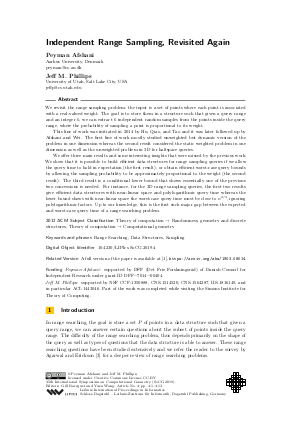Independent Range Sampling, Revisited Again
Authors Peyman Afshani, Jeff M. Phillips
-
Part of:
Volume:
35th International Symposium on Computational Geometry (SoCG 2019)
Part of: Series: Leibniz International Proceedings in Informatics (LIPIcs)
Part of: Conference: Symposium on Computational Geometry (SoCG) - License:
 Creative Commons Attribution 3.0 Unported license
Creative Commons Attribution 3.0 Unported license
- Publication Date: 2019-06-11
File

PDF
LIPIcs.SoCG.2019.4.pdf
- Filesize: 467 kB
- 13 pages
Document Identifiers
Related Versions
-
A full version of the paper is available at [Peyman Afshani and Jeff M. Phillips, 2019], https://arxiv.org/abs/1903.08014.
Subject Classification
ACM Subject Classification
- Theory of computation → Randomness, geometry and discrete structures
- Theory of computation → Computational geometry
Keywords
- Range Searching
- Data Structures
- Sampling
Metrics
- Access Statistics
-
Total Accesses (updated on a weekly basis)
0Document
0Metadata
Abstract
We revisit the range sampling problem: the input is a set of points where each point is associated with a real-valued weight. The goal is to store them in a structure such that given a query range and an integer k, we can extract k independent random samples from the points inside the query range, where the probability of sampling a point is proportional to its weight.
This line of work was initiated in 2014 by Hu, Qiao, and Tao and it was later followed up by Afshani and Wei. The first line of work mostly studied unweighted but dynamic version of the problem in one dimension whereas the second result considered the static weighted problem in one dimension as well as the unweighted problem in 3D for halfspace queries.
We offer three main results and some interesting insights that were missed by the previous work: We show that it is possible to build efficient data structures for range sampling queries if we allow the query time to hold in expectation (the first result), or obtain efficient worst-case query bounds by allowing the sampling probability to be approximately proportional to the weight (the second result). The third result is a conditional lower bound that shows essentially one of the previous two concessions is needed. For instance, for the 3D range sampling queries, the first two results give efficient data structures with near-linear space and polylogarithmic query time whereas the lower bound shows with near-linear space the worst-case query time must be close to n^{2/3}, ignoring polylogarithmic factors. Up to our knowledge, this is the first such major gap between the expected and worst-case query time of a range searching problem.
Cite As Get BibTex
Peyman Afshani and Jeff M. Phillips. Independent Range Sampling, Revisited Again. In 35th International Symposium on Computational Geometry (SoCG 2019). Leibniz International Proceedings in Informatics (LIPIcs), Volume 129, pp. 4:1-4:13, Schloss Dagstuhl – Leibniz-Zentrum für Informatik (2019)
https://doi.org/10.4230/LIPIcs.SoCG.2019.4
BibTex
@InProceedings{afshani_et_al:LIPIcs.SoCG.2019.4,
author = {Afshani, Peyman and Phillips, Jeff M.},
title = {{Independent Range Sampling, Revisited Again}},
booktitle = {35th International Symposium on Computational Geometry (SoCG 2019)},
pages = {4:1--4:13},
series = {Leibniz International Proceedings in Informatics (LIPIcs)},
ISBN = {978-3-95977-104-7},
ISSN = {1868-8969},
year = {2019},
volume = {129},
editor = {Barequet, Gill and Wang, Yusu},
publisher = {Schloss Dagstuhl -- Leibniz-Zentrum f{\"u}r Informatik},
address = {Dagstuhl, Germany},
URL = {https://drops.dagstuhl.de/entities/document/10.4230/LIPIcs.SoCG.2019.4},
URN = {urn:nbn:de:0030-drops-104088},
doi = {10.4230/LIPIcs.SoCG.2019.4},
annote = {Keywords: Range Searching, Data Structures, Sampling}
}
Author Details
Funding
- Afshani, Peyman: supported by DFF (Det Frie Forskningsr\" ad) of Danish Council for Independent Research under grant ID DFF-7014-00404.
- Phillips, Jeff M.: supported by NSF CCF-1350888, CNS-1514520, CNS-1564287, IIS-1816149, and in particular ACI-1443046. Part of the work was completed while visiting the Simons Institute for Theory of Computing.
References
- Peyman Afshani and Jeff M. Phillips. Independent Range Sampling, Revisited Again, 2019. URL: http://arxiv.org/abs/1903.08014.
-
Peyman Afshani and Zhewei Wei. Independent Range Sampling, Revisited. In European Symposium on Algorithms, pages 3:1-3:14, 2017.

-
Pankaj K. Agarwal and Jeff Erickson. Geometric range searching and its relatives. Advances in Discrete and Computational Geometry, pages 1-56, 1999.

-
Sameer Agarwal, Barzan Mozafari, Aurojit Panda, Henry Milner, Samuel Madden, and Ion Stoica. BlinkDB: queries with bounded errors and bounded response times on very large data. In Proceedings of the 8th ACM European Conference on Computer Systems, pages 29-42. ACM, 2013.

-
Surajit Chaudhuri, Rajeev Motwani, and Vivek Narasayya. Random sampling for histogram construction: How much is enough? In ACM SIGMOD Record, pages 436-447. ACM, 1998.

-
T Hagerup, K Mehlhorn, and JI Munro. Optimal algorithms for generating discrete random variables with changing distributions. Lecture Notes in Computer Science, 700:253-264, 1993.

-
Joseph M. Hellerstein, Peter J. Haas, and Helen J. Wang. Online aggregation. ACM SIGMOD Record, 26(2):171-182, 1997.

-
Xiaocheng Hu, Miao Qiao, and Yufei Tao. Independent range sampling. In ACM Symposium on Principles of Database Systems, pages 246-255, 2014.

-
Jiří Matoušek. Efficient partition trees. Discrete &Computational Geometry, 8(3):315-334, 1992.

-
Frank Olken. Random sampling from databases. PhD thesis, University of California at Berkeley, 1993.

-
Frank Olken and Doron Rotem. Random sampling from databases: a survey. Statistics and Computing, 5(1):25-42, 1995.

-
Alastair J. Walker. New fast method for generating discrete random numbers with arbitrary frequency distributions. Electronics Letters, 10(8):127-128, 1974.

